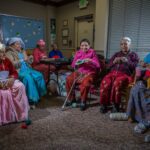This chapter discusses a community-based intervention aimed at enhancing the posttraumatic growth (PTG) of refugees in receiving societies. First, we contextualize this contribution by presenting the literature on PTG in forced migration. Specifically, we present the main factors identified in the literature as fueling the emergence of PTG among refugees, as well as interventions that have been carried out to enhance PTG in this population. We highlight the scarce existence of interventions in general, and of those with a community-based approach in particular. Later, we describe in depth the proposed community-based intervention, providing access to its implementation manual to facilitate its worldwide adaptation. Finally, based on our experience in southern Spain, lessons learned and implications for PTG promotion among forcibly displaced individuals are discussed. We stress the need to value the strengths of the refugees, to create safe community-based scenarios through peer-mentoring and peer-support-group formats, and to offer refugees the possibility of playing an active and meaningful role as agents of change in their own growth and that of their community.
A Systematic Review on the Impact of Trauma-Informed Education Programs on Academic and Academic-Related Functioning for Students Who Have Experienced Childhood Adversity
The purpose of this study was to conduct a systematic review of the existing literature regarding trauma-informed education programs and their impact on academic and academic-related outcomes. The articles included for review (n=15) contained data on trauma-informed education programs implemented in preschool, primary/elementary, and high school settings. Academic and academic-related outcomes reported included attendance, disciplinary…

